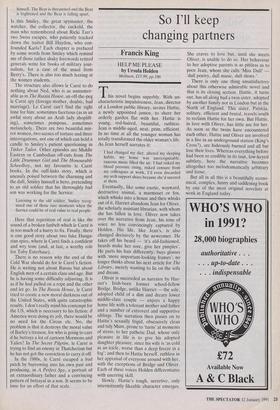So I'll keep changing partners
Francis King
HELP ME PLEASE by Ursula Holden
Methuen, £13.99, pp.186
This novel begins superbly. With un- characteristic impulsiveness, Jean, director of a London public library, invites Hattie, a newly appointed junior, to share her orderly garden flat with her. Hattie is young, red-haired, beautiful, ruthless. Jean is middle-aged, neat, prim, efficient. In no time at all the younger woman has totally transformed the older woman's life. As Jean herself narrates it:
I had changed my diet, altered my sleeping habits, my home was unrecognisable, raucous music filled the air. I had risked my blood pressure rising, risked censure from my colleagues at work, I'd even discarded my arch support shoes because she'd sneered at them.
Eventually, like some exotic, wayward, destructive animal, a marmoset or fox, which whisks into a house and then whisks out of it, Harriet abandons Jean for Oliver, the scholarly assistant librarian, with whom she has fallen in love. Oliver now takes over the narrative from Jean, his tone of voice no less convincingly captured by Holden. His life, like Jean's, is also changed decisively by the newcomer. He takes off his beard — 'it's old-fashioned. beards make her sore, give her pimples'. He parts his hair differently; buys glasses with 'more important-looking frames'; no longer thinks about his next article for The Library, merely wanting to lie on the sofa and dream.
Oliver is succeeded as narrator by Har- riet's Irish-born former school-fellow Bridge. Bridge, unlike Harriet — the sole, adopted child of a dim and dreary lower middle-class couple — enjoys a happy home life with a tolerant mother and father and a number of extrovert and supportive siblings. The narration then passes on to Hattie's sexually frigid, obsessively clean and tidy Mum, prone to 'turns' at moments of stress; to her pathetic Dad, whose only pleasure in life is to give his adopted daughter pleasure, since his wife is 'as cold as an icicle, worse than a deep freeze in a fog'; and then to Hattie herself, ruthless in her appraisal of everyone around with her, with the exceptions of Bridge and Oliver. Each of these voices Holden differentiates with unerring skill.
Slowly, Hattie's tough, secretive, only intermittently likeable character emerges. She craves to love but, until she meets Oliver, is unable to do so. Her behaviour to her adoptive parents is as pitiless as to poor Jean, whom she calls 'Miss Dull' 'dull poetry, dull music, dull shoes.'
There is only one thing unsatisfactory about this otherwise admirable novel and that is its closing section. Hattie, it turns out, has all along had a twin sister, adopted by another family not in London but in the North of England. This sister, Patricia, solitary, efficient and brutal, travels south to reclaim Hattie for her own. But Hattie, in love with Oliver, has little use for her. As soon as the twins have encountered each other, Hattie and Oliver are involved in a fire in an underground station (King's Cross?), are hideously burned and all but lose their lives. Whereas everything before had been so credible in its taut, low-keyed subtlety, here the narrative becomes altogether too melodramatically arbitrary and loose.
But all in all this is a beautifully econo- mical, complex, funny and saddening book by one of the most original novelists at work in England today.










































 Previous page
Previous page